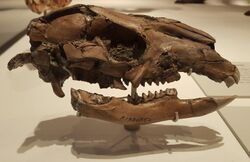Biology:Protemnodon
| Protemnodon[1] Temporal range: Pliocene - Late Pleistocene
| |
|---|---|

| |
| Skull of Protemnodon anak at the Melbourne Museum | |
| Scientific classification | |
| Kingdom: | Animalia |
| Phylum: | Chordata |
| Class: | Mammalia |
| Infraclass: | Marsupialia |
| Order: | Diprotodontia |
| Family: | Macropodidae |
| Subfamily: | Lagostrophinae |
| Genus: | †Protemnodon Owen, 1874 |
| Type species | |
| †Protemnodon anak Owen, 1874
| |
| Paleospecies | |
| |
Protemnodon is an extinct genus of megafaunal macropodids that existed in Australia , Tasmania, and New Guinea in the Pliocene and Pleistocene. Members of this genus are also called giant kangaroos.
Taxonomy
Recent analysis of mtDNA extracted from fossils indicates that Protemnodon was closely related to Macropus.[2] The species formerly known as Protemnodon bandharr and Protemnodon buloloensis have been moved to a new genus, Silvaroo, while the New Guinean species P. nombe has been moved to the new genus Nombe.[3]
Description

Based on fossil evidence, Protemnodon is thought to have been physically similar to wallabies, but generally larger and more robust. Protemnodon roechus was the largest in the genus, weighing around 170 kg.[4]
Several species of Protemnodon survived up until around 50,000 years ago. P. tumbuna may have survived in the highlands of Papua New Guinea as recently as 12,000 years B.P.[5]
References
- ↑ Haaramo, M. (20 December 2004). "Mikko's Phylogeny Archive: Macropodidae - kenguroos". http://www.fmnh.helsinki.fi/users/haaramo/Metazoa/Deuterostoma/Chordata/Synapsida/Metatheria/Notometatheria/Diprotodontia/Macropodidae.htm.
- ↑ Llamas, B.; Brotherton, P.; Mitchell, K. J.; Templeton, J. E. L.; Thomson, V. A.; Metcalf, J. L.; Armstrong, K. N.; Kasper, M. et al. (2014-12-18). "Late Pleistocene Australian marsupial DNA clarifies the affinities of extinct megafaunal kangaroos and wallabies". Molecular Biology and Evolution 32 (3): 574–584. doi:10.1093/molbev/msu338. PMID 25526902.
- ↑ Kerr, Isaac A. R.; Prideaux, Gavin J. (2022-06-29). "A new genus of kangaroo (Marsupialia, Macropodidae) from the late Pleistocene of Papua New Guinea". Transactions of the Royal Society of South Australia 146 (2): 295–318. doi:10.1080/03721426.2022.2086518. ISSN 0372-1426. Bibcode: 2022TRSAu.146..295K. https://doi.org/10.1080/03721426.2022.2086518.
- ↑ Helgen, K.M.; Wells, R.T.; Kear, B.P.; Gerdtz, W.R.; Flannery, T.F. (2006). "Ecological and evolutionary significance of sizes of giant extinct kangaroos". Australian Journal of Zoology 54 (#4): 293–303. doi:10.1071/ZO05077.
- ↑ Flannery, T.F.; Mountain, M-J.; Aplin, K. (1983). "Quaternary kangaroos (Macropodidae: Marsupialia) from Nombe rock shelter, Papua New Guinea, with comments on the nature of megafaunal extinction in the New Guinea highlands". Proceedings of the Linnean Society of New South Wales 107 (2): 75–97. https://www.biodiversitylibrary.org/page/34925381#page/93/mode/1up.
Wikidata ☰ Q136448 entry
 |
